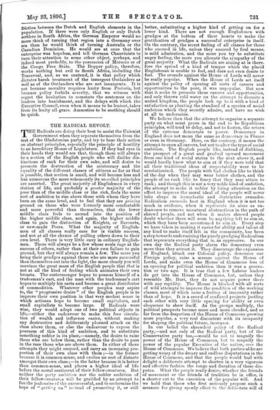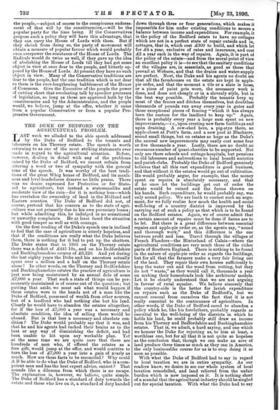THE RADICAL REVOLT.
THE Radicals are doing their beat to assist the Unionist Government when they separate themselves from the rest of the Gladstonian party, and try to base their action on abstract principles, especially the principle of hostility to an hereditary House of Legislature. If they bad eyes in their heads they would see that, though there will always be a section of the English people who will dislike dis- tinctions of rank for their own sake, and will desire to promote the destruction of the aristocracy and the equality of the different classes of citizens so far as that is possible, that section is small, and will become less and less numerous the more vehemently its so-called principles are asserted. The great majority of Englishmen in every station of life, and probably a greater majority of the poor than of the middle class or the rich, feels the same sort of ambition to rise above those with whom they have been on the same level, and to feel that they are gaining ground on those who were formerly more comfortable and more powerful than themselves, that the lower middle class feels to ascend into the position of the higher middle class, and again, the higher middle class to gain the distinction of Knights, or Baronets, or new-made Peers. What the majority of English- men of all classes really care for is visible success, and not at all the chance of pulling others down to their own level. There is very little envy in ordinary English- men. There will always be a few whose souls rage at the success of others, rather than at their own failure to gain ground, but they will always remain a few. The more you bring their grudges against those who are more successful than themselves out into the light, the more clearly you will convince the great mass of the English people that that is not at all the kind of feeling which animates their own breasts. The costermonger hopes to possess himself of a tradesman's cart, and the man with the tradesman's cart hopes to multiply his carts and become a great distributor of commodities. Whatever other peoples may aspire to, the "progressive desire" of the English people is to improve their own position in that very modest sense in which artisans hope to become small capitalists, and small capitalists to become large. If Radicals were wise, they would adopt one of two political objects in life,—either the endeavour to make this free circula- tion of wealth and influence easier, without making any destructive and deliberately planned attack on the class above them, or else the endeavour to expose the poorness of this kind of ambition, and to substitute something nobler in its place,—namely, the desire to raise those who are below them, rather than the desire to pass in the race those who are above them. In either of these attempts they might succeed, and carry an increasing pro- portion of their own class with them ;—in the former because it is common-sense, and excites no sort of distaste amongst their own class ;—in the latter because it is better than common-sense, and places a higher ideal of life before the moral sentiment of their fellow-creatures. But neither the petty ambition nor the nobler ambition of their fellow-creatures will be gratified by an attempt to fan the jealousies of the unsuccessful, and to undermine the hope of "getting " inqtead of promoting it, or still better, substituting a higher kind of getting on for a lower kind. There are not enough Englishmen with grudges at the bottom of their hearts to make the gratification of grudges a successful enterprise in itself. On the contrary, the secret feeling of all classes for those who succeed in life, unless they succeed by foul means, is mild admiration, and the more you try to substitute angry feeling, the more you alienate the sympathy of the great majority. What the Radicals are aiming at is there- fore the spread of a kind of temper which the placid Englishman is unable to feel, and does not even desire to feel. The crusade against the House of Lords will never be really popular. When the House of Lords set itself against the policy of opening all sorts of careers and opportunities to the poor, it was unpopular. But now that it seeks to promote these careers and opportunities, and only throws cold water on the attempt to disunite a united kingdom, the people look up to it with a kind of satisfaction as planting the standard of a species of social ambition which they secretly admire, and have no wish at all to undermine.
We believe then that the attempt to organise a separate party on what must prove in the end to be Republican principles, will tend to delay, and not to hasten, the return of the extreme democrats to power. Democracy in England does not mean the same as democracy in France or even in Germany. Here, on the contrary, it means the attempt to open all careers, but not to alter the type of social ambition. The English people like, instead of disliking, the prospect of a great and gradual upward movement from one kind of social status to the next above it, and would hardly know what to aim at if they were told that all their traditional ideas of respectability were to be revolutionised. The people with bad clothes like to think of the day when they may wear better clothes, and the people of no rank like to fancy that they may attain to rank ; and though this is not a very noble kind of ambition, the attempt to make it nobler by fixing attention on the effort to improve the moral ideal of the people will never take shape in iconoclastic and destructive crusades. Radicalism succeeds best in England when it is not too much in evidence, when it represents its aims as en- deavours to remove unnatural obstructions in the path of shrewd people, and not when it makes shrewd people doubt whether there will soon be anything left to aim at, which they have been accustomed to aim at. Every step we have taken in making it easier for ability and talent of any kind to make itself felt in the community, has been a step towards undermining the purely grudging Radicalism that represents everything that is, as oppressive. In our own day the Radical party alarm the democracy even more than they attract it. They discourage the expansion of England, attack our Colonial policy, denounce our Foreign policy, raise a scream against the House of Lords, and make even the House of Commons less of an opening for political ambition than it was a genera- tion or two ago. It is true that a few Labour leaders do get into the House of Commons, but, unless they resemble Mr. Burt, they do not acquire power there with any rapidity. The House is blocked with all sorts of wild attempts to improve the condition of the working classes, most of which raise a feeling of insecurity rather than of hope. It is a crowd of confused projects jostling each other with very little opening for ability or even eloquence to show itself. As the groups multiply, the political prospects become more and more clouded, and so far from the despotism of the House of Commons growing more popular, a very real discontent with its incapacity for shaping the political future, increases.
In our belief the shrewdest policy of the Radical party,—and not only of the Radical party, but of the Conservative party too,—would be not to magnify the power of the House of Commons, but to magnify the power of the popular Executive of the nation, over the House of Commons. We believe that both parties alike are getting weary of the dreary and endless disputations in the House of Commons, and that the people would bail with delight a deliberate attempt to shorten in a very vigorous and effective fashion the range and duration of these dis- putes. What the people really desire, whether the friends of movement or the friends of tradition be in office, is a shorter cut to the execution of the popular will. And we hold that those who first seriously propose such a measure for giving speedy effect to the deliberate will of the people,—subject of course to the conspicuous endorse- ment of that will by the constituencies,—will be the popular party for the time being. If the Conservatives propose such a policy they will have this advantage, that they can carry the House of Lords with them. But if they shrink from doing so, the party of movement will obtain a measure of popular favour which would probably even overpower the resistance of the House of Lords. The Radicals would do twice as well, if they gave up the idea of abolishing the House of Lords till they had got some object in view at once dear to the people, and bitterly op- posed by the House of Lords. At present they have no such object in view. Many of the Conservative traditions are dear to the people, but the one tradition which is not dear to them is the ever-lengthening babblement of the House of Commons. Give the Executive of the people the power of cutting short that everlasting talk by speedier processes of legislation, so long as these are approved both by the constituencies and by the Administration, and the people would, we believe, jump at the offer, whether it came from a popular Conservative or from a popular Pro- gressive Government.



































 Previous page
Previous page